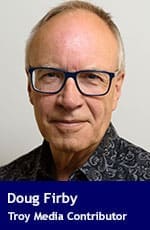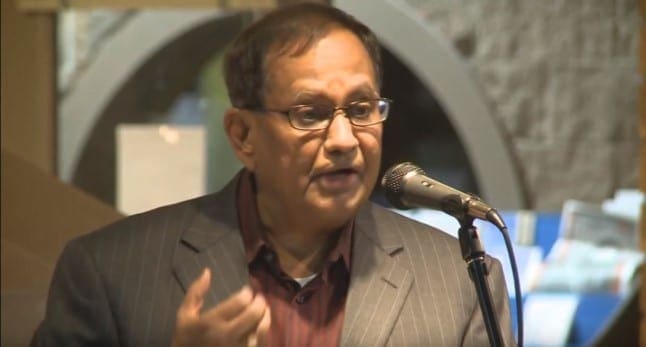 The quiet passing a couple of weeks ago of a retired economics professor from Calgary’s Mount Royal University is a footnote in Alberta history worth noting.
The quiet passing a couple of weeks ago of a retired economics professor from Calgary’s Mount Royal University is a footnote in Alberta history worth noting.
As an immigrant from Sri Lanka more than three decades ago, Vettivelu Nallainayagam not only helped shape the economics program at that school, but also became an influential fixture in the multicultural community in the city. His volunteer work included terms on the boards of the Calgary Public Library, Education Matters, Glenbow Museum, the Action Dignity (the former Ethno-Cultural Council) and the Sri Murugan Society of Alberta.
His accolades included the Queen’s Jubilee Award, Immigrant of Distinction Award and the Teaching Excellence Award at MRU.
As laudable as those accomplishments are, it’s also worth noting that he swam against the popular tide of economic theory in the province, a stance that put him outside the establishment of the day – branded as a liberal. Yet Nallai (his easier-to-pronounce nickname) wore that label with pride, as he also did big-L Liberal.

Nallai taught economics at Mount Royal University
Nallai was an unapologetic Keynesian in a Milton Friedman world. Anyone who has taken an Economics 101 class will know those references. For the rest of us, let me offer a brief summary of the differences.
Keynesian economics is based on the theories of John Maynard Keynes, who lived through the Great Depression and published a book in 1936 called The General Theory of Employment, Interest and Money. He advocated for a managed market economy – in other words, an economy driven by the private sector but with government intervention during economic downturns.
Governments should use public money and take on new debt to stimulate the economy when times are bad, Keynes argued, much as Alberta’s NDP government chose to do during its recent term in office.
In Alberta, and indeed some other parts of Canada, Keynesian politics have fallen out of favour because governments have amassed soaring debts. It seems most governments have never grasped the fact that Keynes also argued that debt could – and should – be paid down when prosperity returns.
In reality, with the exception of just a few governments – think Ralph Klein’s mid-1990s Progressive Conservatives – most put the short-term popularity boost of giving money away like candy ahead of showing the discipline to get the financial house in order for the next inevitable trough in the economy.
Friedman, on the other hand, was among the leaders of the Chicago school of economics, a neoclassical school of thought that rejected Keynesian theories in favor of monetarism. Friedman dismissed Keynes’s theories as “naive” and extolled the virtues of a free market economic system with minimal intervention.
During his heyday in the 1980s, Friedman served as an adviser to U.S. President Ronald Reagan and British Prime Minister Margaret Thatcher. In his influential book Capitalism and Freedom, Friedman argued that government should only involve itself in the economy when absolutely necessary for the survival of its people and the country. The best of a country’s abilities come from its free markets while its failures come from government intervention, he wrote.
Essentially, Friedman argued that markets rarely go wrong.
History (think the U.S.’s prime mortgage meltdown in 2008) has thrown that belief into doubt. After all, we should know greed unchecked will ultimately kill the golden goose. Critics also argue that Friedman’s neoliberal policies have contributed to massive income disparities and inequality.
It’s not the least surprising to see why Nallai favoured the theories of Keynes. Those theories are seen as more compassionate to people who are down on their luck, whereas Friedman’s economics are seen as cold-hearted – a kind of Darwinian survival of the fittest.
When I met Nallai in the early 2000s, I found his compassionate and intelligent voice a refreshing counterpoint to the free-market advocates who were dominant in the media. I invited him to write a column for a major daily newspaper I was working for and he did so for years.
It strikes me that a world without people like Nallai would be a darker place. You don’t have to embrace his economic theories to recognize that in every government there’s a need for compassion. It fits with Nallai’s broader views on community – that there are no differences that we can’t overcome if we show the desire and ability to approach them with an open mind.
Nallai was a quiet, humble man who never sought the spotlight but yet was willing to stand up for what he believed in. In a province where free-market economics is once again back in fashion, his moderating voice is sadly missed. His humanity, however, lives on.
Veteran political commentator Doug Firby is president of Troy Media Digital Solutions and publisher of Troy Media.
The views, opinions and positions expressed by columnists and contributors are the author’s alone. They do not inherently or expressly reflect the views, opinions and/or positions of our publication.


